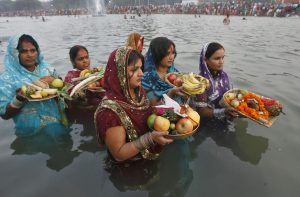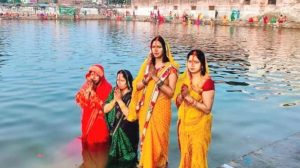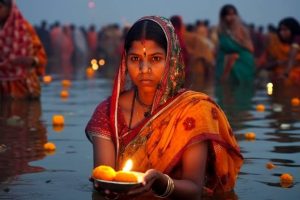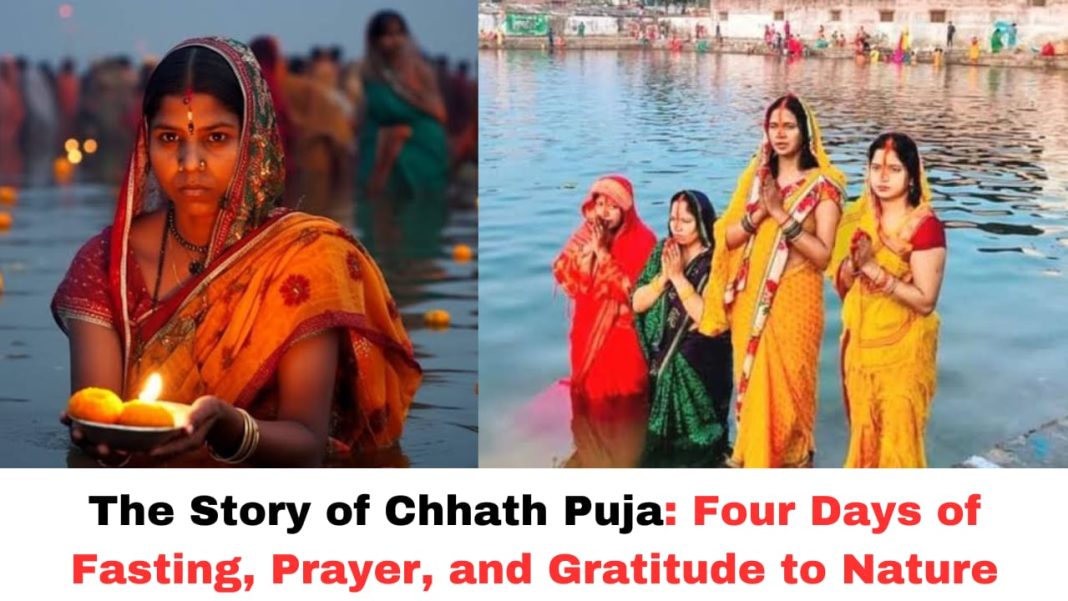DIGITAL NEWS GURU RELIGIOUS DESK :
Chhath Puja, one of the most ancient and sacred festivals celebrated in India, primarily in the states of Bihar, Jharkhand, Uttar Pradesh, and parts of Nepal, is a testament to the enduring spiritual and cultural traditions of the Indian subcontinent. Observed with extraordinary devotion and enthusiasm, Chhath Puja is dedicated to worshipping the Sun God (Surya) and Chhathi Maiya (Goddess Usha, the goddess of dawn) for granting life, sustenance, and blessings. The festival’s origins trace back to Vedic times, and it is celebrated with a series of rituals over four days, marking a unique and elaborate form of expressing gratitude to nature.
The Significance of Chhath Puja
Chhath Puja holds deep religious and cultural significance. Devotees believe that the Sun God is the source of all power and life, governing health, wealth, and prosperity. By performing rituals during this period, worshippers express gratitude and seek blessings for the well-being of their family. Unlike many other festivals, Chhath Puja is devoid of idolatry and focuses on the elements of nature: the Sun and water. The Sun is considered a deity of immense energy and power, and the rituals revolve around paying homage to this life-giving force.

One of the most revered aspects of the festival is the observance of strict rituals and disciplines by the devotees, who are usually women, though men also participate. The rituals involve fasting, abstaining from drinking water (Nirjala Vrat), and performing prayers at the riverbanks. This practice underscores the themes of self-discipline, purity, and spiritual cleansing.
The Four-Day Rituals
The celebration of Chhath Puja spans four days, with each day carrying a unique set of practices and rituals.
- Nahay Khay: The first day marks the beginning of the festival, where devotees take a holy dip in a river or pond and prepare a traditional meal. The kitchens and houses are cleaned meticulously to maintain purity. The food prepared is simple and satvik (devoid of garlic and onion) and is consumed by the devotees as a form of purification.
- Lohanda and Kharna: On the second day, the devotee observes a fast throughout the day and breaks it in the evening after offering prayers to the Sun God. A special meal, usually consisting of kheer (sweet rice pudding), puris (fried bread), and fruits, is prepared. After this meal, a strict 36-hour fast without water begins, displaying immense devotion and physical discipline.
- Sandhya Arghya (Evening Offerings): The third day is the most important part of Chhath Puja. Devotees, dressed in traditional attire, carry out a ritualistic procession to riverbanks, where they offer prayers and perform the Sandhya Arghya, or evening offerings, to the setting Sun. This event draws thousands of devotees to river ghats, creating a mesmerizing scene of lamps, songs, and collective prayer.
- Usha Arghya (Morning Offerings) and Breaking the Fast: On the final day, devotees gather at the riverbank before dawn to offer prayers to the rising Sun. This marks the culmination of the rituals. The festival concludes with the breaking of the 36-hour fast, after which prasad (sacred food) is distributed among family and friends, symbolizing the completion of the worship and the sharing of blessings.
Cultural Aspects and Regional Variations
Chhath Puja is celebrated not only for its spiritual significance but also for its cultural and social dimensions. The festival fosters a sense of unity and communal harmony as families and neighbors come together to celebrate. Songs dedicated to Chhath Maiya and Surya Dev resonate through the air, enriching the spiritual atmosphere. Women often sing traditional folk songs that have been passed down through generations, and these songs capture the emotions, stories, and history of this vibrant festival.

In Bihar, the heartland of Chhath Puja, the celebration is marked by great pomp and elaborate preparations. Riverbanks, ponds, and water bodies are transformed into beautifully decorated venues with lighting and offerings. In urban centers like Patna, special arrangements are made to manage the crowds and ensure the safety of the devotees.
In other parts of India and among the diaspora, Chhath Puja is celebrated with equal fervor. In cities like Delhi and Mumbai, where there is a significant population from Bihar and Uttar Pradesh, large gatherings are organized at public water bodies, demonstrating the festival’s far-reaching impact.
Environmental and Social Impact
Chhath Puja also emphasizes the importance of clean water and the environment. In recent years, there has been a growing awareness about the ecological impact of the festival. Efforts are being made by local governments and environmental groups to keep the riverbanks clean and minimize pollution. Campaigns promoting the use of eco-friendly materials for offerings and the proper disposal of waste have gained momentum, reflecting a broader awareness of environmental conservation.

Moreover, the festival has significant social implications. It is a time for family reunions, where people often travel long distances to be with their loved ones. The communal aspect of preparing prasad, cleaning the surroundings, and participating in rituals together strengthens familial and societal bonds.
Conclusion
Chhath Puja is a beautiful celebration that intertwines spirituality, culture, and devotion. It is a time when millions come together to pay homage to the Sun, offering prayers of gratitude and hope. The rigorous fasts and unwavering discipline exhibited by devotees symbolize the strength of faith and the resilience of the human spirit. Despite modern changes, the festival remains a powerful reminder of the importance of respecting and living in harmony with nature. As Chhath Puja continues to grow in prominence, its message of gratitude and environmental awareness becomes even more relevant in today’s world.
You May Also Read: Shah Rukh Khan’s Death Threat: The Shadow of Threat Looms Over Bollywood’s Icons








